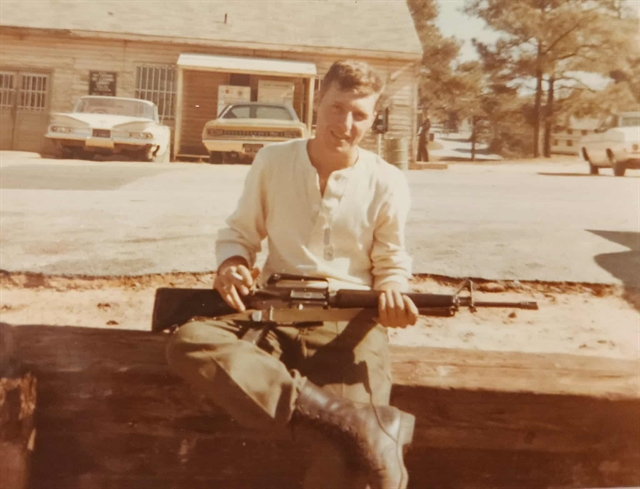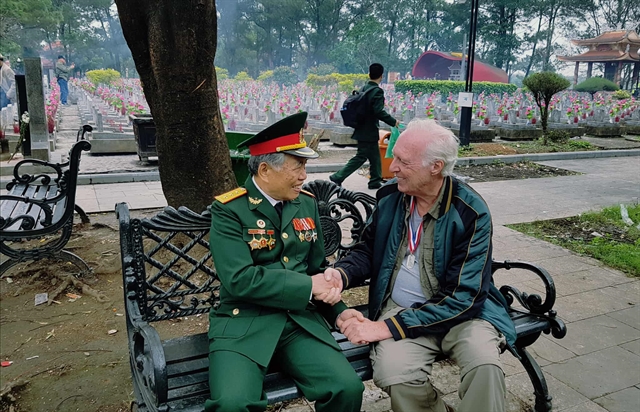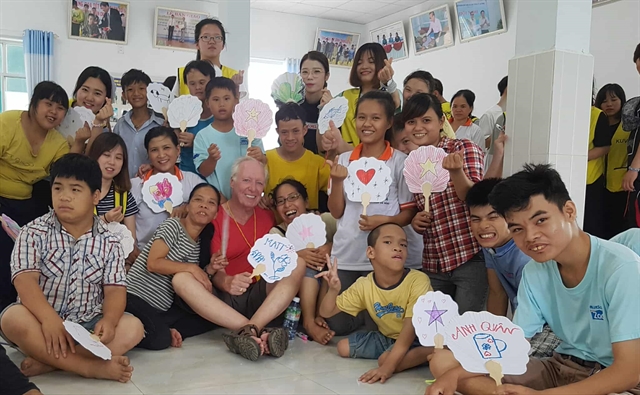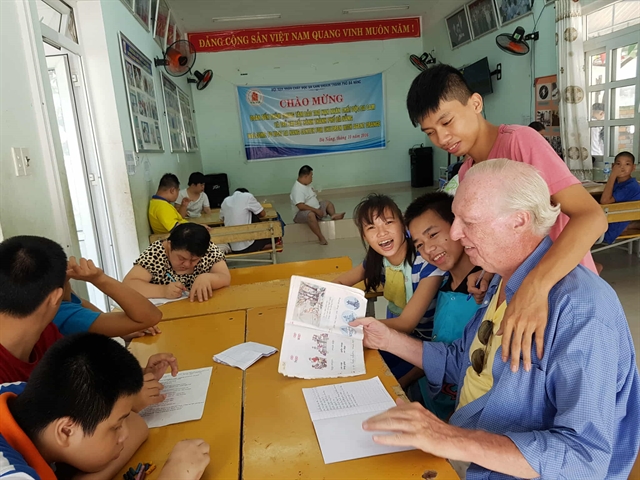 Expat Corner
Expat Corner

 |
| Matthew Kennan at a military base in the US in the 1970s. Kennan has been doing volunteer work at the Đà Nẵng Association of Victims of Agent Orange for years. Photos courtesy of Matt Kennan |
Việt Nam will celebrate the 50th anniversary of the country’s Reunification Day (April 30, 1975-2025) with a series of activities from north to south. Matthew Kennan, a former US soldier, was in Việt Nam during the American War (known in the US as the Việt Nam War) in the 1970s. He shared his memories of historical moments in central Việt Nam from half a century ago with Việt Nam News.
By Công Thành
When and how did you join the war in Việt Nam?
I was inducted in the US Army in 1970. In September 1971, I received orders to go to Việt Nam. I was stationed in Chu Lai between September and November 1971, and in Đà Nẵng from November 1971 to May 1972. My unit was responsible for closing US military bases, processing soldiers to leave South Việt Nam and turning over the military bases to the South Vietnamese Army (ARVN).
When you look back at the war, what do you reflect on?
 |
| Matthew Kennan, a former US soldier, meets a Vietnamese veteran at a cemetery in Việt Nam. Kennan returned to Việt Nam to assist Agent Orange victims and do volunteer work. |
I often think about my experience during the war. First, being away from my home, family and friends and the fear of being killed and never going home alive. I also think about the suffering of everyone on both sides from the fighting, rocket attacks, bombing and spraying of Agent Orange (AO).
50 years later, the legacy of the conflict continues to affect all those involved: North Việt Nam, South Việt Nam, South Korea, Australia and the US. I also think about the political choices made that intensified the conflict when other options for peace could have been pursued. I think about the history with the French and the division of Việt Nam into North and South. It seems that unnecessary complications were created.
How do you think you were exposed to Agent Orange?
Agent Orange was a defoliant sprayed not only in areas of fighting, but in and around military bases and airfields. This, the most toxic chemical ever created, was absorbed by the land and water sources. Personally, I never saw spraying of Agent Orange, but I was assigned to military bases in Chu Lai and Đà Nẵng that are considered to be Agent Orange hotspots. My veteran administration records indicate that my cancer was from exposure to herbicides in Southeast Asia, which would have been in Chu Lai and Đà Nẵng. The toxic herbicides continued to contaminate land and water for long periods of time, and rose from the land to the air.
How has Agent Orange affected your own health and daily life?
I was diagnosed with cancer. Some veteran friends had Agent Orange illnesses and died. I miss them. My daily life has been affected in many ways. I had to have surgery, radiation and hormone treatments which decrease my strength and stamina. There are physical difficulties regarding urinary and sexual function that will last til I die. Consequently, I have to live every day adjusting to what I am capable of doing and not doing.
Do you remember the moment you first realised the full impact of Agent Orange on both Americans and Vietnamese?
 |
| Kennan with Agent Orange-affected children in a Đà Nẵng centre for victims of AO. He has been working as a volunteer supporting and assisting AO kids. |
In the mid-1980s, I read news reports about Agent Orange possibly causing illnesses in American and Vietnamese war veterans. But there was no wide coverage. Gradually, more and more veterans were getting sick and dying before the age of 70. I became aware of the full impact of Agent Orange around 2013, when I and other veteran friends were suddenly being diagnosed with a variety of cancers and other illnesses. I realised the full impact when I came to Việt Nam in 2015 and saw the effects on the Vietnamese people with disabilities and serious health problems.
I then did more research and to this day continue to learn more about the Agent Orange tragedy.
Why did you decide to move to Đà Nẵng?
I decided to move to Việt Nam because I had a natural bond with Vietnamese also affected by the Agent Orange chemical. I was introduced to the Đà Nẵng City Association for Victims of Agent Orange day care centres and saw an opportunity to help and be a voice to spread awareness about the effects of Agent Orange. I also had the opportunity to raise funds to support the day care centres. Also very important were the welcoming Vietnamese people, now living in peace and going to work, school and restaurants with no fear or danger.
How do Vietnamese families react when they learn that an American veteran is helping them?
The Vietnamese families have been very helpful and supportive. I always feel they are gratified. For me it is an enchanting engagement which brings joy, and it’s mutual from both sides.
What keeps you motivated to continue this work, despite your own health challenges?
My motivation to continue is to be resilient and not give up. I see others with much bigger problems who can’t walk, some cannot see and others can't hear or talk. Being involved is a healthy choice, to keep busy with opportunities to create more friendships and support for the Agent Orange victims. I saw that resilience is what made Việt Nam overcome a history of difficulties.
What message would you want future generations – both in Việt Nam and the US – to understand about the legacy of Agent Orange?
Unfortunately, it appears that the consequences of Agent Orange will be with us for many more years -- if not in the land and water, through heredity in the multiple generations that have been and continue to be affected. It is important to remember that humankind is capable of creating chemicals that have devastating consequences on the environment and life. A proud culture celebrates independence and unification, but it must also remember and learn from the past.
Reformation and reconciliation is built on a foundation of trust which helps cure the wounds of war, and we must continue the pursuit of finding solutions by working together.
What role has coming back to Việt Nam and helping victims of Agent Orange played in your own personal journey?
 |
| AO kids share paintings with Matthew Kennan at the Đà Nẵng centre for AO victims. |
My journey upon returning to Việt Nam has brought me peace of mind, joy and a spirit of dedication to work with others to make life better for other people less fortunate. Teamwork works. I have also come to learn that courage can create good things.
Do you think coming back to Việt Nam has brought you a sense of closure and peace?
As I said before, most certainly yes. War experiences create heavy burdens to carry. Coming back helped remove the burdens in the back of my mind, but they will always remain.
With reformation and reconciliation there is a sense of redemption.